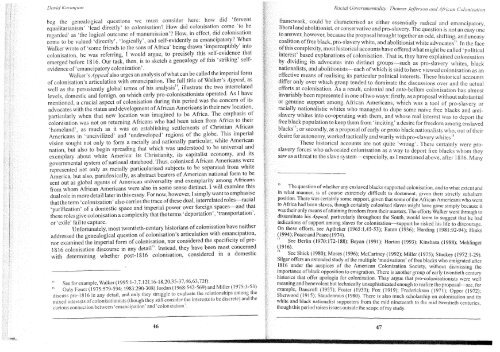Shane Moran - Alternation Journal
Shane Moran - Alternation Journal
Shane Moran - Alternation Journal
Create successful ePaper yourself
Turn your PDF publications into a flip-book with our unique Google optimized e-Paper software.
David EiLzzcznjlaw Racial C;overrznzentalitj~: 7'howzus JL.J&-,-.son irllrl /IJI.icnn ~ . ~ l ~ ~ j , ~<br />
beg the gellealogical questions we must consider here: how did 'fervent<br />
eclualitarianis& 'lead directly' to colonisation? HOW did colonisation colne 'to be<br />
regarded' 'the logical outcome of manuinissioil"! HOW, in effect, did colollisation<br />
come to be valued 'directly', 'logically', and self-evidently as emancipato~? When<br />
Walker wrote of 'some friellds to the sons of Africa' being drawn 'ilnperceptibly' into<br />
colonisatioll, he was referring, 1 would argue, to precisely this self-evidence that<br />
emerged before 1 8 16. Our task, then, is to sketch a genealogy of this 'striking' selfevidence<br />
of 'einancipatory colonization'.<br />
Walker's Appeal also urges an analysis ofwhat can be called the imperial form<br />
ed as either essentially radical and emancipatory,<br />
tive and pro-slavery. The question is not an easy one<br />
posal brought together an odd, shifting, and uneasy<br />
ite, and abolitionist white advocatesi". In the fBce<br />
counts have offered what might be called 'political<br />
of colonisation. That is, they have explained colonisation<br />
nto distinct groups-such as pro-s]avely whites, black<br />
, and abolitionists-each of which is said to have viewed colonisation as an<br />
of colonisation's al-ticulation with emancipation. The full title of Walker's Appeal, as<br />
well as the persistently global terms of his analysis1', illustrate the two interrelated<br />
levels, dolnestic and foreign, on which early pro-colonisationists operated. As 1 have<br />
a cl-ucial aspect of colonisation during this period was the collcen1 of its<br />
advocates with the status and developinellt of African Americans in their new location,<br />
particularly when that new location was imagined to be Africa. The eln~hasis of<br />
colonisation was not on returning Africans who had been taken from Africa to their<br />
'llomeland', as inuch as it was on establishi~lg settlernellts of Christian African<br />
Americans in 'uncivilized' and 'undeveloped' regions of the globe. This ilnperial<br />
vision sought not only to fo1-m a racially and nationally particular, white American<br />
nation, but also to begin spreading that which was understood to be ulliversal and<br />
exelnplaly white America: its Christianity, its capitalist econonlY, and its<br />
governmental system of national statehood. Thus, colonised African Alnericans were<br />
represented not only as racially particularised sublects to be separated fro111 white<br />
America, but also, paradoxically, as abstract bearers of American national form to be<br />
sent out as global agents of American universality and exelnplarity among Africalls<br />
tended to dominate the discussions over the actual<br />
esult, colonial and ante-belluln co]onisatioll has allnost<br />
riabl~ been represented in one oftwo ways: firstly, as aproposal without substantial<br />
elluille support among Ati-ican Americans, which was a too) of pro-slavery or<br />
ho managed to dupe some naive free blacks and antielY<br />
whites into co-operating with them, and whose real interest was to deport the<br />
black population to keep them from 'inciting' a desire for fi-eedorn alnong enslaved<br />
early or proto black nation~list~ who, out oftlleir<br />
tically and warily with pro-slavely ~v~litcslx,<br />
These historical accounts are not cluite 'wrol1g'. The,-e certainly were procry<br />
forces who advocated colonisation as a way to deport free blacks whom they<br />
asathreatto the slave system--especially, as I inentioiled above, aftel- ] 81 6. M~~~<br />
from African Americans were also in some sense distinct. 1 will examille this<br />
dual role in more detail later in this essay. For now, however, I silnply wanttoemphasise<br />
that the term also carries the trace of these dual, interrelated roles-racial<br />
of a domestic space and imperial power over foreign spaces-and that<br />
these roles give colonisation a colnplexiq that the terms 'depoliation', 'trans~o*ation',<br />
or 'exile' fail to capture.<br />
unfol-tunately, most twentieth-century historians of colonisation have neither<br />
addressed the genealogical question of colonisation's articulation with emancipation,<br />
nor examined tile imperial form of colonisation, nor considered the specificity of pre-<br />
1816 colonisation discourse in any detail". Instead, they have been most c~xerned<br />
asters. The efforts Walker went tflrougll to<br />
te his Appeal, particularly throughout the South, would seem to suggest illat had<br />
s of support among slaves for colonisation-support he risked his life to discourage,<br />
efforts, see Aptheker (1965:1,45-53); Eaton (1936); Harding (1981:92-94): Hillks<br />
with delemining whether post- 18 16 colonisation, considered in a dolnestic artney (1992): Miller (1975); Stuckey (1972: 1-29),<br />
" ~ ~ ~ f ~ r ~ ~alker(l995:1-3,7.12f,16-18,20,35-37.46.63,72f),<br />
~ a m ~ l e ,<br />
ly unsophisticated enough to realize the proposal-see, for<br />
15 F~~~~ (1975:579-594; 1983:290-308) ~ordan (1968:542-569) and Miller (1975:3-53)<br />
discuss 1 g 16 in any detail. alld only they struggle to evaluate the relalions1li~s amollg<br />
953); FOX (1919); Frederickson (197 1); Opper (1972);<br />
the<br />
). There is also mucli scholarship on colonisation and its<br />
mixed intel-ests ofcolollisationists (tllougl~ they still consider the interests to be discrete) and the<br />
from the mid nineteenth to the lnid twentieth centuries,<br />
curious connectioll between 'e~nancipation' and 'colo~lizatioll'. ugh this period raises issues outside the scope of study.
















